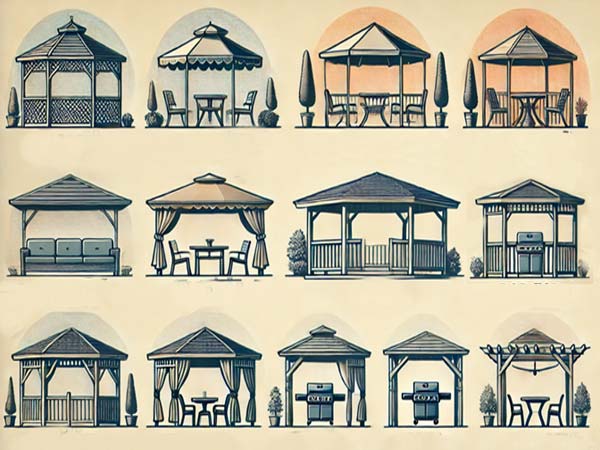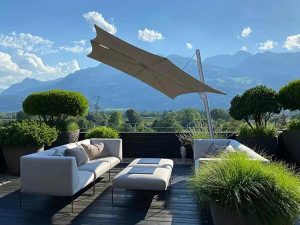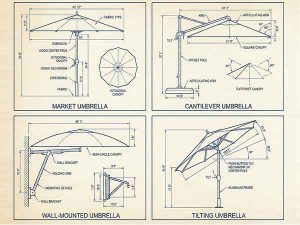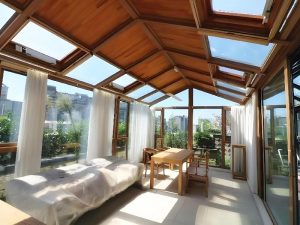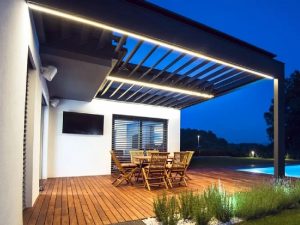Gazebos are a cornerstone of outdoor living, offering both functionality and style for gardens, patios, and events. However, choosing the right gazebo isn’t just about aesthetics – it’s about understanding the types available and how they meet specific needs. For suppliers, knowing these classifications helps in stocking the right products for their market, while buyers can make better decisions for their homes or businesses.
In this article, we’ll break down the main types of gazebos and their features, and explore recent trends in the European and North American markets. Whether you’re a supplier or a buyer, this guide will help you navigate the options and select the perfect gazebo to suit your goals.
What Are the Main Types of Gazebos?
Choosing the right gazebo starts with understanding the different types available. From materials and frame designs to functionality and style, each category serves a unique purpose, catering to various climates, budgets, and usage scenarios. For suppliers, knowing these classifications ensures the right products for the market. For buyers, it helps match gazebos to their intended purpose.
1. Based on Roof Material: Hardtop Gazebo vs. Soft Top Gazebo
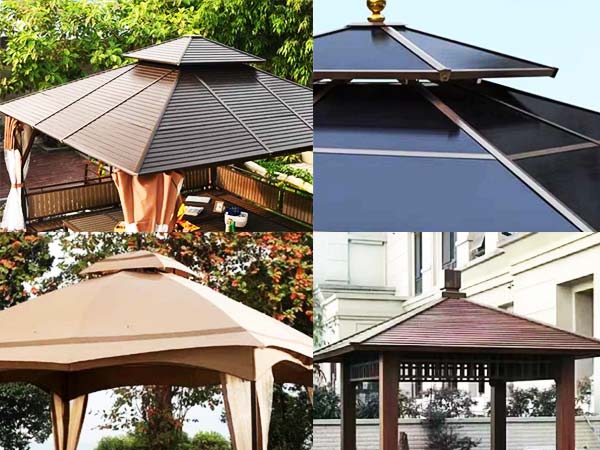
The roof is one of the most critical components of a gazebo, directly impacting its durability, weather resistance, and overall functionality. Depending on your needs and environment, you can choose between two primary roof types: hardtop and soft top.
You May Like: 8 Different Materials for Gazebo Roof
| Feature | Hardtop Gazebo | Soft Top Gazebo |
| Material | Aluminum, Galvanized Steel, Polycarbonate Panels | High-Density Polyester Fabric, PVC-Coated Fabrics |
| Durability | Highly durable, withstands extreme weather (rain, snow, wind) | Less durable, suited for mild weather conditions |
| Weather Resistance | Excellent: Year-round use, UV-resistant, waterproof | Moderate: UV-treated, waterproof, not ideal for heavy weather |
| Maintenance | Low: Easy to clean, long-lasting | Moderate: Fabric may require replacement over time |
| Portability | Fixed structure, not portable | Lightweight, easy to assemble and disassemble |
| Price | Higher cost due to premium materials | More affordable, budget-friendly |
| Best For | Permanent structures, harsh climates | Temporary use, mild climates, backyard events |
2. Based on Roof Material: Aluminum vs. Steel vs. Wooden
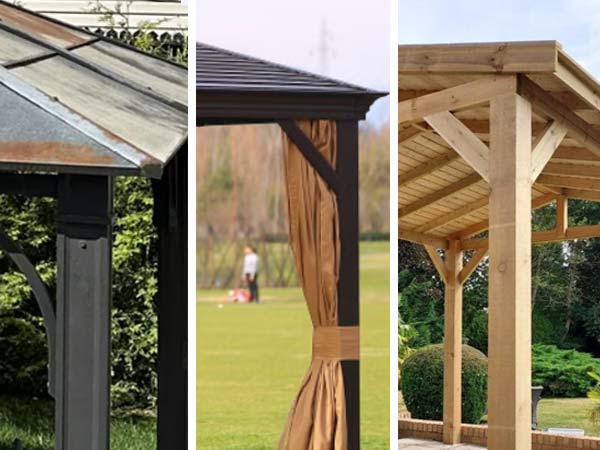
The frame material of a gazebo determines its stability, longevity, and suitability for different climates and uses. Here are the three most common materials used in gazebo frames, along with their unique features and applications.
| Material | Pros | Cons | Best For |
| Aluminum | Lightweight, rust-resistant, easy to maintain | Less sturdy in high winds | Humid climates, modern designs |
| Steel | Sturdy, durable, weather-resistant | Heavier, may rust if coating is damaged | Windy or snowy regions, permanent setups |
| Wood | Natural, classic aesthetic | Requires regular maintenance, prone to rot | Gardens, rustic or traditional designs |
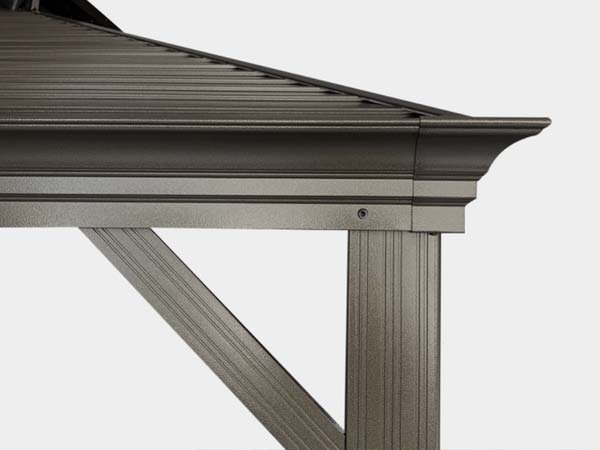
3. Based on Design Styles
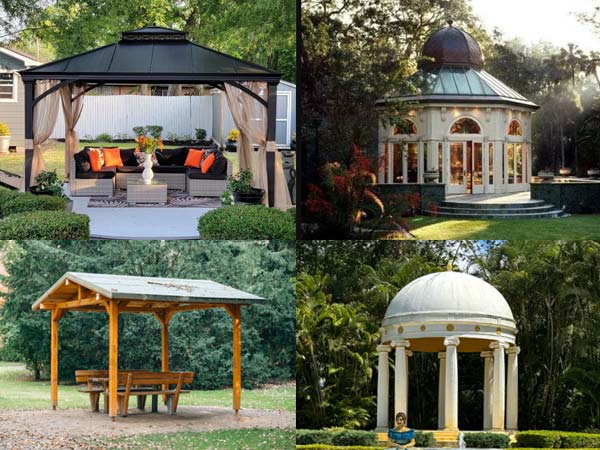
The design style of a gazebo is more than just aesthetics – it determines how the structure integrates into its surroundings and serves its purpose. Let’s get to know the most popular gazebo design styles, their key features, and suitable applications
| Style | Key Features | Best For |
| Modern | Minimalist, sleek, low-maintenance | Urban patios, commercial spaces |
| Classic | Octagonal/hexagonal, decorative details | Gardens, countryside, traditional settings |
| Rustic | Natural materials, earthy tones | Farmhouses, vineyards, forested areas |
| Pergola | Open roof, plant-friendly design | Gardens, outdoor dining, greenery integration |
| Dome/Arch | Elegant curves, intricate details | Weddings, luxurious outdoor areas |
4. Functionality-Based Types
Gazebos can be categorized by their functionality, as different designs cater to specific needs and usage scenarios. Whether for leisure, events, or practical purposes, understanding these types helps suppliers and buyers find the perfect match.
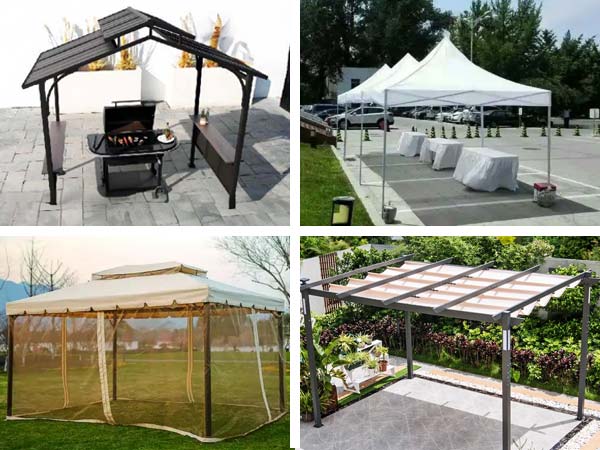
| Type | Key Features | Best For |
| Patio Gazebo | Versatile, comfortable, all-purpose | Backyards, lounging areas |
| Grill Gazebo | Fireproof, organized, cooking-focused | Barbecues, outdoor events |
| Pop-Up Gazebo | Portable, easy setup, lightweight | Camping, markets, temporary events |
| Pergola | Open design, decorative, plant-friendly | Gardens, outdoor dining |
| Screened Gazebo | Bug protection, breathable, zippered panels | Insect-prone areas, outdoor relaxation |
How to Choose the Right Gazebo for Your Market
With so many gazebo types available, how do you decide which one suits your market or customers best? The right choice depends on several factors we list below. Whether you’re a supplier looking to stock popular products or a buyer seeking the perfect fit, these may be helpful. Let’s explore them.
| Factor | Options/Considerations | Best Fit For |
| Climate | Hardtop gazebos: withstand extreme weather like snow, rain, wind | Harsh climates (Northern Europe, North America) |
| Soft top gazebos: suited for mild, seasonal use | Mild climates (Southern Europe, Central America) | |
| Usage | Patio gazebos: relaxation and outdoor lounging | Backyards, residential spaces |
| Grill gazebos: outdoor cooking with fireproof roofs | Barbecue areas, outdoor kitchens | |
| Pop-up gazebos: portable and easy-to-assemble | Events, camping, and temporary setups | |
| Aesthetic Appeal | Modern designs: sleek aluminum frames, neutral tones | Urban homes, commercial spaces |
| Traditional styles: wooden or octagonal designs | Gardens, countryside | |
| Pergolas: open designs, plant-friendly structures | Green spaces, decorative landscaping | |
| Budget | Premium: hardtop gazebos, screened gazebos with extra features | High-end buyers, luxury markets |
| Budget: soft tops, pop-up gazebos | Cost-conscious buyers | |
| Market Trends | Eco-friendly: bamboo or recycled plastic materials | Sustainable product markets |
| Smart features: lighting, solar panels, Bluetooth integration | Luxury and tech-savvy customers |
Market Trends of Gazebo Types in Europe and North America
In recent years, gazebo designs have evolved to meet the growing demand for modern, functional, and sustainable outdoor living spaces.
Sleek, rectangular structures with materials like tempered glass and aluminum are replacing traditional octagonal designs, emphasizing simplicity and style. Multi-functional gazebos are on the rise, serving as outdoor dining areas, barbecue zones, or even home offices, while smart technology integration – such as LED lighting and Bluetooth speakers – is transforming gazebos into hubs for entertainment.
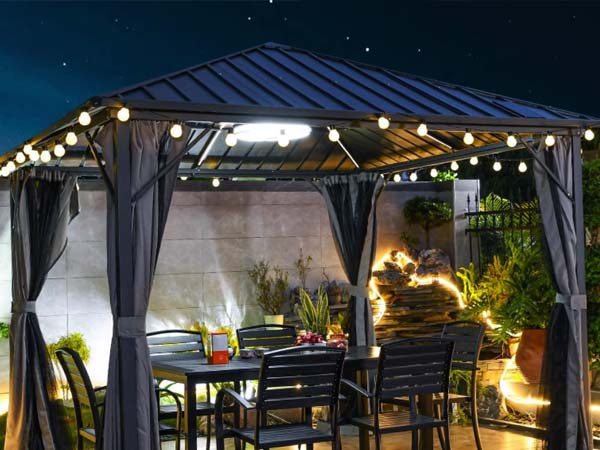
Sustainability is also a key trend, with eco-friendly materials like bamboo and recycled plastics gaining popularity among environmentally conscious consumers. Meanwhile, hardtop gazebos, prized for their durability and weather resistance, remain a favorite for year-round use in harsh climates. These trends reflect a shift towards versatile, innovative, and greener gazebo options that cater to modern lifestyles in Europe and North America.
Don’t Miss: Outdoor & Patio Furniture Trends 2025
Conclusion
Gazebos are more than just outdoor shelters – they are the centerpiece of functional and stylish living spaces. Whether you’re a supplier looking to stock products that align with market demands or a buyer seeking the perfect addition to your backyard, understanding gazebo types is key. With the insights and trends shared in this guide, you’re now equipped to make informed decisions and create outdoor spaces that inspire relaxation, creativity, and connection with nature.
If you’re interested in purchasing gazebos, don’t hesitate to contact LIDA OUTDOOR. Our factory, located in Zhejiang – China’s hub for outdoor furniture manufacturing – offers a wide range of gazebo types designed to suit the needs of markets in Europe, North America, and beyond.

